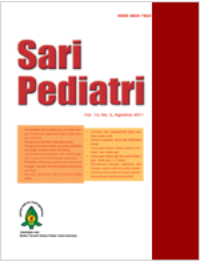Faktor Prognostik Kegagalan Terapi Epilepsi pada Anak dengan Monoterapi
Sari
Latar belakang. Epilepsi merupakan salah satu penyakit neurologi utama pada anak. Banyak faktor yang
memengaruhi kegagalan monoterapi epilepsi pada anak sehingga akan berdampak pada keberhasilan terapi
epilepsi secara keseluruhan.
Tujuan. Mengetahui faktor prognostik yang dapat digunakan untuk memprediksi kegagalan monoterapi
epilepsi pada anak
Metode. Penelitian kasus-kontrol pada pasien epilepsi usia 6 bulan sampai dengan 18 tahun yang berobat
ke Poli Anak RSUP Dr. Sardjito tahun 2009. Kasus adalah pasien epilepsi yang gagal dengan monoterapi
dan kontrol adalah pasien epilepsi yang berhasil dengan monoterapi.
Hasil. Didapat 120 pasien dengan 60 pasien kelompok kontrol dan 60 kelompok kasus. Dilakukan analisis
univariat pada masing-masing faktor prognostik. Berdasarkan analisis univariat didapatkan beberapa faktor
prognostik kegagalan monoterapi, yaitu terapi epilepsi yang tidak segera, frekuensi serangan kejang sebelum
terapi, status epileptikus, adanya defisit neurologis, dan adanya kelainan neurologi penyerta. Setelah dianalisis
secara multivariat, faktor frekuensi serangan kejang sebelum terapi >10 kali (OR 14,196, IK95%:3,576-
56,348; p<0,01) dan adanya kelainan neurologi penyerta (OR 18,977, IK95%:3,159-113,994; p<0,01 )
merupakan faktor prognostik kegagalan monoterapi
Kesimpulan. Hasil penelitian ini menunjukkan bahwa anak epilepsi dengan serangan kejang lebih dari
sepuluh kali sebelum terapi dan adanya kelainan neurologi penyerta merupakan faktor prognostik kegagalan
monoterapi.
Kata Kunci
Teks Lengkap:
PDFReferensi
WHO. Epilepsy: aetiogy, epidemiology and progonosis.
WHO Fact Sheet 2001a;1965.
Sander JW. The natural history of epilepsy in the era of
new antiepileptic drugs and surgical treatment. Epilepsia
;44(Suppl 1):17-20.
Cavazos JE, Lum F, Spitz M. Seizure and epilepsy :
Overview and classification. 2003. Diakses tanggal 18
Januari 2014. Didapat dari: http://www.emedicine.com/
neuro/topic415.htm.
Sillanpaa M, Jalava M, Kaleva O, Shinnar S. Long-term
prognosis of seizures with onset in chilhood. N Engl J
Med 1998;338:1715-22.
Kwan P, Brodie MJ. Early identification of refractory
epilepsy. N Engl J Med 2000;342:314-9.
Dlugos DJ,Sammel MD, Strom BL, Farrar JT. Response
to first drug trial predict outcome in childhood temporal
lobe epilepsy. Neurology 2001;57:2259-64.
Camfield PR, Gordon K, Dooley JM. If a first
antiapileptic drug fails to control a child’s epilepsy, what
are the chances of success for the next drug. J Pediatr
;131:821-4.
Art WFM, Greets AT, Brouwer OF, Peter ACB, Stroink
H, Donselaar CAV. The early prognosis of Epilepsy in
childhood: the prediction poor outcome. The Dutch Study of Epilepsy in Childhood, Epilepsia 1999;40;726-
Sillanpaa M. Remission of seizure and predictors
of intractability in long-term follow-up. Epilepsia
;34:930-6.
Kwan P, Brodie MJ. Potential role of drugs transporters
in the pathogenesis of medically intractable epilepsy.
Epilepsia 2005;46:224-35.
Berg AT, Shinnar S. Relapse following discontinuation of
epileptic drugs: a meta analysis. Neurology 1994;44:601-
Oskoui M,Webster RI, Zhang X, Shevel MI. Factors
predictive of outcome in childhood epilepsy. J Child
Neurol 2005;20:898-904.
Engel JJ. Epileptic syndromes in infancy and early
childhood. Proceedings of the international symposium
of epileptic syndromes in infancy and early childhood
- evidence - based toxonomy and its implications in the
ILAE classification; Tokyo, Jepang; 29 April 2005 - 01
Mei 2005. Epilepsy Res 2006;70:S1-279.
Brodie MJ. Medical therapy of epilepsy: When to initiate
treatment and when to combine? J Neurol 2005;252-
Cunnington MC, Webb DJ, Irizarry MC, Manjunath
R. Risk factors for antiepileptic drug regimen change in
patients with newly diagnosed epilepsy. Epilepsy Behav
;21:168–172.
Ramzi, Yati S, Sunartini. Faktor prediktor epilepsi
refrakter onset anak di awal terapi obat anti epilepsi
Universitas Gadjah Mada (Tesis). Yogyakarta: Fakultas
Kedokteran Universitas Gadjah Mada, 2007.
Heiemann. Strategies for analyzing the generation
and causes of drug resistant seizure in temporal
lobe epilepsy. In Wolf P, editor: Epileptic seizures
and syndromes; London: John Libbey & Company
Ltd;1994.h.605-17.
Morrel. Secondary epileptogenesis in man. Arch Neurol
;42:318-35.
DOI: http://dx.doi.org/10.14238/sp16.4.2014.248-53
Refbacks
- Saat ini tidak ada refbacks.
##submission.copyrightStatement##
##submission.license.cc.by-nc-sa4.footer##
Email: editorial [at] saripediatri.org


Sari Pediatri diterbitkan oleh Badan Penerbit Ikatan Dokter Anak Indonesia
Ciptaan disebarluaskan di bawah Lisensi Creative Commons Atribusi-NonKomersial-BerbagiSerupa 4.0 Internasional.




